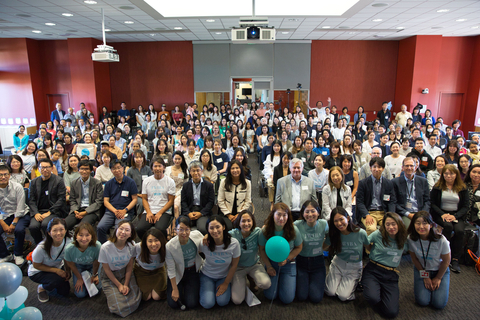New Surveys Provide Insights on Gender Disparities and DEI Challenges Among Japanese Expatriates and Variety of Career Paths in Silicon Valley
The Japanese Women’s Initiative in the Bay Area (JWIBA), which empowers Japanese women in Silicon Valley, has unveiled new and eye-opening DEI survey insights and case study observations completed over the past few months.
This press release features multimedia. View the full release here: https://www.businesswire.com/news/home/20241113319720/en/

JWIBA Summer Summit 2024 at Stanford University, Photo courtesy of Hiroyuki Inoue
Key Survey Insights: Women Take Initiative, But Face Structural Barriers
The survey, Career Development of Silicon Valley Expatriates, sheds fresh light on the unique challenges faced by Japanese expatriates, especially women, in the male-dominated landscape of Silicon Valley. The insights highlight the proactive steps women take to pursue these roles even though they may face structural barriers that limit their ability to fully capitalize on their expatriate experiences.
Despite growing emphasis on gender equality in Japan, expatriate roles in North America remain heavily male-dominated, with 85.2% male and only 14.8% female representation.¹ JWIBA surveyed 42 men and women who have experienced expatriation and repatriation. The results highlighted:
- Proactivity Among Women: 74.2% of women pursued Silicon Valley assignments of their own volition, compared to only 36.4% of men, suggesting that women are more proactive in seeking overseas roles but may face fewer opportunities
- Skills Acquired in Expatriation: Both male and female expatriates reported similar levels of skill acquisition (communication, English proficiency, mental toughness), but men reported higher utilization of these skills after returning, especially in networking, cross-cultural communication and presentation skills
- Diversity, Equity & Inclusion (DEI) Awareness: Over 90% of respondents noted changes in their values regarding DEI due to expatriation and, notably, 72.7% of men experienced “significant” change, indicating a shift in their views on diversity through international assignments
- Barriers to Female Participation in Expatriate Assignments: Women most frequently cited a need for increased awareness among women, while men pointed to organizational systems and culture, highlighting potential unconscious bias and the need for systemic change in organizations to increase female representation
Case Study Observations: Diverse Career Transitions
Another report, Career Transition: Diverse Career Cases and Approaching Career Changes Across the U.S. and Japan, presents individual case observations on the diverse career paths of over 50 Japanese individuals. The report illustrated varied examples including those who accompanied their partners to the U.S., earned higher or professional degrees, and were then hired by local companies; postdoctoral researchers who later joined startups; those who arrived as expatriates with young children; and those who joined local companies and eventually founded their own startups.
While these findings are not statistically representative, they share insights on the challenges faced, best practices adopted and the mutual support networks they developed. They also explore how they balance personal and professional lives, while incorporating learnings from the concept of “Planned Happenstance ²,” as a common factor among the interviewees.
“We strive to create a society where everyone, especially women, can choose their own paths – whether in their careers, families, studies or volunteer activities – and be accepted and supported by those around them,” said Ryoko Hirano, Co-President at JWIBA. “To make our activities more sustainable, we have established the community as a formal nonprofit organization. We aim to be a community and provide a platform that encourages and supports those who are determined to pursue their life and career goals.”
“Thanks to the efforts of dedicated volunteers, these valuable reports were conducted and completed within just a few months,” said Makiko Kawabe, Co-President at JWIBA. “In addition, what is important in enriching our life and career is building a community of peers—people who share the same vision and aspirations. JWIBA aims to remain a place where such like-minded people come together.”
JWIBA extends its heartfelt gratitude to all the individuals who participated in the surveys and interviews. Their insights have been instrumental in uncovering key findings, such as the proactive efforts women take to secure overseas roles despite facing structural barriers, and the varied career paths Japanese expatriates navigate. These contributions have helped us better understand the landscape and will guide JWIBA’s ongoing efforts to foster a supportive and inclusive community. Together, JWIBA will continue to empower and uplift Japanese women as they build their careers in Silicon Valley and beyond.
About JWIBA
JWIBA (Japanese Women’s Initiative in the Bay Area) started in November 2022 to foster a community for women connecting Japan and the San Francisco Bay Area. The organization supports women’s career development and promotes DEI through its annual summit, regular meetups, and workshops. It has hosted 10+ events with over 1,000 participants total in-person and online. JWIBA was incorporated as a nonprofit organization in August 2024, to reinforce JWIBA’s mission to support women’s career development and to promote DEI across the Japan-Silicon Valley community.
For more information, visit www.jwiba.org.
Footnotes:
¹ Ministry of Foreign Affairs of Japan. "Survey on Japanese Nationals Living Abroad and Gender Representation in Expatriate Assignments." Survey statistics on Japanese people living overseas in North America (2018).
² Mitchell, Kathleen E., Levin, Al S., and Krumboltz, John D. "Planned Happenstance: Constructing Unexpected Career Opportunities." Journal of Counseling & Development 77, no. 2 (1999): 115–124.
View source version on businesswire.com: https://www.businesswire.com/news/home/20241113319720/en/
Contacts
Media Contact
Azusa Terasaki
Chief Communication Officer, JWIBA
info@jwiba.org














